Index relies entirely on the support of donors and readers to do its work.
Help us keep amplifying censored voices today.
[vc_row][vc_column][vc_column_text]Index on Censorship was established in 1972 in a febrile period: Idi Amin had taken power in Uganda, the Vietnam war continued, direct rule was imposed in Northern Ireland, there was a coup in Bolivia and Congo was renamed Zaire by its dictator president. As writer Robert McCrum said in our 40th anniversary issue: “The abuses of freedom worldwide in the 1970s were so appalling and so widespread that the magazine rapidly found itself in the frontline of campaigns. Index became a clarion voice in the cause of free expression.” The right to protest and freedom of expression are now being sought in Hong Kong and elsewhere, and Index is still to the forefront in reporting abuses. Here are just some of the conflicts between freedom and dictatorship we have reported on in the past 47 years.
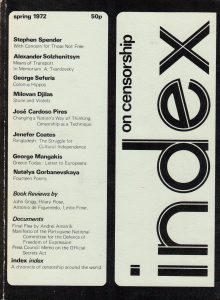
The first issue of Index on Censorship magazine, in March 1972
The Clockwork Show vol 1, issue 1, March 1972
In an anonymous article about life in Greece under the regime of the Colonels’ junta, the writer considered the psychology of the situation; the feelings and attitudes, the long-ranging impact of this harrowing experience. “There is nothing more demoralizing than to be bound to a public body, an administration, a government with which one can never for a moment identify, which is the exact opposite of everything one believes in. One cannot live side by side with Philistinism, chauvinism, bigotry, blatant hypocrisy, crass ignorance, injustice, violence and brutality and not be affected by them, even if one manages—only just—to keep them out of one’s own life. Under this regime there is no relief; no exception: the regime has penetrated every single aspect of public life.”
Read the full article
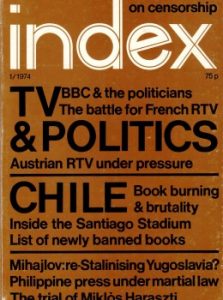
March 1974: TV, politics and Chile Index on Censorship magazine
Book burning and brutality vol 3, issue 1, March 1974
A fascinating insight into life in Chile six months after a coup ended the tyranny of President Salvador Allende: worse was to come under a military dictatorship, reported Michael Sanders, an Englishman in Santiago. “When Allende left Chile to address the UN in December 1972, a leading opposition newspaper had as its front-page a photo depicting the president flushing himself down a lavatory, with the caption ‘ good riddance’. The contrast in December 1973 is gloomy indeed. Not so much, or not only because of the drab uniformity of censored newspapers that, for all they may be censored, willingly reflect the views of the Military Junta. But for the fact that 43.6% of the population have been deprived of all means of expression, of all normal communication, and live in daily fear of their lives and jobs.”
Read the full article

Russia, East Germany, South Africa: May 1979 Index on Censorship magazine
Black journalists under apartheid volume 8, issue 3, May 1979
William A Hachten reports: Black journalists came to the fore in the Soweto riots of 1976 when they reported from the ghetto for a white press without access. Yet black journalists still faced daily harassment under apartheid, which worsened with the death of Steve Biko in 1977. Vusi Radebe, a black stringer for the Rand Daily Mail, said: “The situation is worse since the 1976 riots. Police will beat up reporters on the slightest provocation for what they consider obstruction of justice.” While whites had 23 newspapers, there were none for non-whites to express their political frustration. Black journalist Pearl Luthuli said: “The black journalist can’t be objective. We try to tell it like it is but the white editors won’t print it.” Another said: “We are black people first, journalists second. If it comes to a conflict between the struggle and the job, the struggle comes first.”
Read the full article

Beckett and Havel: Index on Censorship magazine, February 1984
Iran under the party of God, volume 13, issue 1, February 1984
“Censorship was planned by the regime of the Islamic Republic even before the February 1979 revolution brought Ayatollah Khomeini’s theocratic oligarchy to power. This particular kind of censorship may not be without precedent in history, but it must certainly be rare. There were attacks on coffee-houses, restaurants and other public places by men armed with clubs and stones; unveiled women were harassed; slogans of the opposition were cleaned from the walls; banks, cinemas and theatres were burned” – a personal account of the first years of the revolution and its attack on culture, by one of Iran’s leading writers Gholam Hoseyn Sa’edi. “And it keeps on happening. The Islamic regime of today has gone a step beyond censoring the creations of science, culture and art, beyond censoring life itself: it has rendered life vain and all but unliveable.”
Read the full article
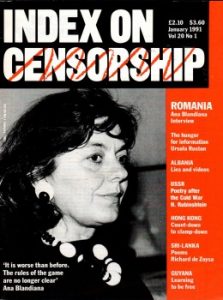
Romania, Albania, USSR: Index on Censorship magazine January 1991
A sense of solidarity, volume 20, issue 1, January 1991
Romania’s celebrated poet, Ana Blandiana, on censorship under Ceausescu and how she fought back. Her work was completely banned three times. “In my case, the form of censorship progressed from the banning of a word to that of a line, then of a poem, then of a book, to the total erasure of my signature as author: an eradication of identity. My inner freedom was assured by a decision I took in 1980, a personal one rather than as a writer. I decided to be outspoken and say what I thought at the risk of becoming a victim myself, rather than suspect a possibly honest person. At first it kept me sane, and then it helped me to be a normal writer, relatively free of self-censorship. This was the strongest form of censorship under Communism in the last 10 or 15 years, and was much more refined and subtle than the official censorship.”
Read the full article
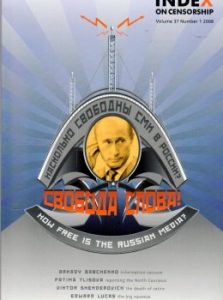
How free is the Russian media? Index on Censorship, Spring 2007
The Big Squeeze, volume 37, issue 1, Spring 2008
“The fact remains that since the departure of the oligarchs, Russian media freedom has gone from the imperfect and beleaguered to the moribund. At national television, which 90 per cent of Russians say is their main source of news, editors receive weekly or even daily instructions from the Kremlin on the ‘line to take’ on important stories; around half of Russian viewers think that what they watch is objective, a 2007 poll said. Foreign coverage is polemical and outrageously politicised. The message of all this is ‘be quiet’. If you annoy the rich and powerful you face threats, beatings or death. Even when the Kremlin is not directly involved, its reaction to the persecution of journalists sends a clear message: if you offend the powerful, don’t expect the law to protect you.” Edward Lucas gave an early taste of what freedom of expression meant under Putin.
Read the full article
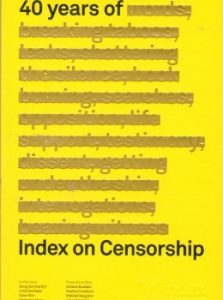
40 years of Index on Censorship March 2012
Grit in the engine, volume 41, issue 1, Spring 2012
Robert McCrum on the 40th anniversary of Index on Censorship. “The success of Index was not a foregone conclusion. Stephen Spender, its founder, was fully alert to the potential for windbaggery and failure. There was, he wrote, ‘the risk that the magazine will become simply a bulletin of frustration’. Actually, the opposite came to pass. Index became a clarion voice in the cause of free expression. The abuses of freedom worldwide in the 1970s were so appalling and so widespread that the magazine rapidly found itself in the frontline of campaigns. Perhaps the most important thing Index did, from the beginning, was to universalise an issue in peril of becoming a special interest: freedom was not ‘a luxury enjoyed by bourgeois individualists’. Along with self-expression, it was a human right, and an instrument of human consciousness.
Read the full article
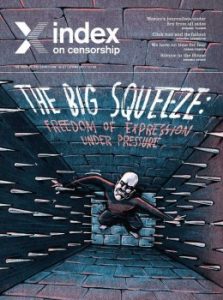
The big squeeze: Index on Censorship magazine Spring 2017
Freedom of expression under pressure, volume 46, issue 1, Spring 2017
The spring 2017 issue of Index on Censorship magazine looks at how pressures on free speech are currently coming from many different angles, not just one. Special features on how to spot fake news, articles from former BBC World Service director Richard Sambrook and former UK attorney general Dominic Grieve, an exclusive interview with the Spanish puppeteer arrested last year, and fiction from award-winning writer Karim Miské.
[/vc_column_text][/vc_column][/vc_row]

Umberto Eco, March 2010, Paris. Credit: Flickr / Abderrahman Bouirabdane
I am of the firm belief that even those who do not have faith in a personal and providential divinity can still experience forms of religious feeling and hence a sense of the sacred, of limits, questioning and expectation; of a communion with something that surpasses us.What you ask is what there is that is binding, compelling and irrevocable in this form of ethics.
I would like to put some distance between myself and the subject. Certain ethical problems have become much clearer to me by reflecting on some semantic problems – don’t worry if people say this discourse is difficult; we are perhaps encouraged into easy thinking by the ‘revelations’ of the mass media, which are, by definition, predictable. Let people learn to ‘think difficult’ because neither the mystery nor the evidence are easy to deal with.
My problem was whether there were ‘semantic universals’, or basic concepts common to all humanity that can be expressed in all languages. Not so obvious a problem once you realise that many cultures do not recognise notions that seem obvious to us: for example, that certain properties belong to certain substances (as when we say ‘the apple is red’) or concepts of identity (a=a). I became convinced that there certainly are concepts common to all cultures, and that they all refer to the position of our body in space.
The article is available for free until the end of March. To read it in full, click here.
Garzon is dressed as the kitchen maid of Government Palace. There is a party attended by ‘Tirifijo'[FARC commander], who is playing cards. President Andres Pastrana is talking to US ambassador Myles Frechette. He taunts Frechette with a riddle:
It is white, Colombia makes it and gringos eat it.”
Frechette answers: “It must be salt.”
Pastrana: “No, it is not salt.”
Frechette: “Ifit is not salt, then it must be the coco [nut].”
The maid says: “Yes, yes, it’s the coco, that little magic powder we
are always talking about.”
An advert for ELN guerrillas directed at the small investor. Voiceover:
Worried about your money? Relax, you no longer have to worry about money. Invest your savings in official certificates. ELNs are the only market instruments that can convert a heap of oil into a mountain of money. Remember that nefarious liquid emissions are not taxable or subject to deductions at source. There’s no time to waste, invest now in nefarious liquid emissions. Your future will be like oil: black.
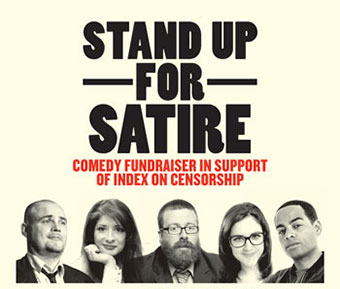 Index on Censorship has been publishing articles on satire by writers across the globe throughout its 43-year history. Ahead of our event, Stand Up for Satire, we published a series of archival posts from the magazine on satire and its connection with freedom of expression.
Index on Censorship has been publishing articles on satire by writers across the globe throughout its 43-year history. Ahead of our event, Stand Up for Satire, we published a series of archival posts from the magazine on satire and its connection with freedom of expression.
14 July: The power of satirical comedy in Zimbabwe by Samm Farai Monro | 17 July: How to Win Friends and Influence an Election by Rowan Atkinson | 21 July: Comfort Zones by Scott Capurro | 24 July: They shoot comedians by Jamie Garzon | 28 July: Comedy is everywhere by Milan Kundera | Student reading lists: Comedy and censorship
A woman looking out her window sees the Rodriguez family [drug cartel] leaving their apartment block. The family is wanted by the police. She calls the police. The captain regretfully informs her that the Rodriguez family does not exist, he has checked the phonebook and there is no Rodriguez family listed. The woman perseveres:
I’ve spent the last 25 minutes trying to hand you these bad men. Now they are leaving. They’re getting into a car with some politicians. God! These politicians are like Pontius Pilate, some denied him and others wash their hands of him. But captain, if you come quickly you’ll understand what is happening in this country. Too late, they’re gone. I’ll call you again next week.
Edited transripts of television satires by journalist and humourist Jaime Garzon (1995). At Gam on 13 August 1999, Garzon was executed on his way to the Radionet studio by two men riding on a motorcycle. Garzon, known for his intervention in the stalled peace process, had reportedly been threatened by Carlos Castano, head of the paramilitary United Self-Defence Force of Colombia (AUC), in the preceding days. According to colleagues, Garzon planned to meet Castano on 14 August 1999. The AUC denied any responsibility in the assassination. Translated by Paulo Drinot.
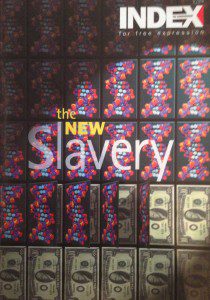 This article is from the January/February 2000 issue of Index on Censorship magazine and is part of a series of articles on satire from the Index on Censorship archives. Subscribe here, or buy a single issue. Every purchase helps fund Index on Censorship’s work around the world. For reproduction rights, please contact Index on Censorship directly, via [email protected]
This article is from the January/February 2000 issue of Index on Censorship magazine and is part of a series of articles on satire from the Index on Censorship archives. Subscribe here, or buy a single issue. Every purchase helps fund Index on Censorship’s work around the world. For reproduction rights, please contact Index on Censorship directly, via [email protected]
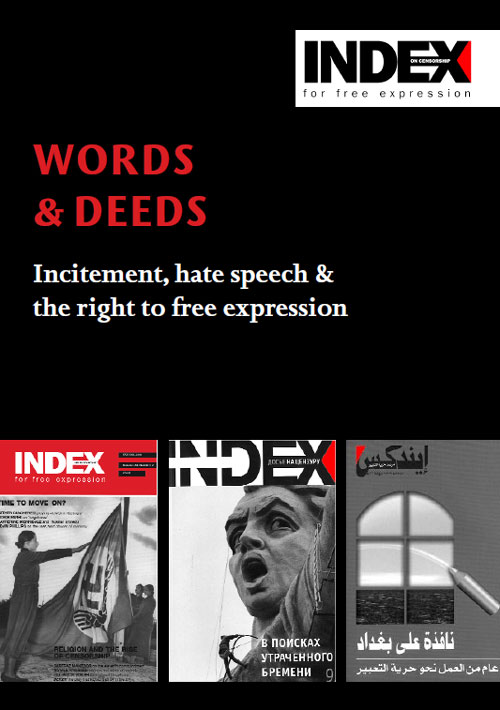
Download the full PDF of Words and Deeds: Incitement, hate speech and the right to free expression. First published December 2005, Revised 2006
This collection was prepared for the EU NGO Forum that took place on 8-9 December 2005 and revised in 2006.
At the end of the Maastricht summit in l992, the Council of Ministers reported on what they saw as a paradox of history: that racism had increased as democracy had spread through the post-communist world. Not such a paradox really. As Hans Magnus Enzensburger once said:‘With democracy, all the dirt comes out.’
Index believes that free expression is the freedom on which all others are based. Ronald Dworkin famously said in its pages that free speech is what makes people feel human, makes them feel their lives matter. But we also need to be clear about our fierce defence of free expression – that there are prices to be paid for it – and we need to be clear about the cost, and who is paying it.
Hate speech – abusive, dehumanising, inciting discrimination and violence – is an integral part of the ‘dirt’ that goes with democracy, often directed at ethnic minorities, gays or women. It is certainly the most troubling matter for people who believe in free speech, and there has been fierce debate over the years about that difficult borderline between free speech and the demand for equality of respect – not least in the pages of Index on Censorship over its 33 years of existence.
But then, on 11 September 2001, the world changed, and hate speech acquired another, newer relevance. The ‘war on terrorism’ (a war that may never end, according to US Vice President Dick Cheney) put civil liberties under threat worldwide. And since then the right to free expression has too often become a fragile filling, sandwiched between the imperatives of security and fears about acts of terrorism. In these dangerous times, hate speech is centre stage, and the ways in which we respond to it are crucial to our future.
The importance of free expression is as great as ever, as is the need to debate openly difficult issues – ones which may cause pain, offence, anger. Nobody ever said free expression was easy. Index’s purpose is to do its small part in creating a world in which the right to speak for oneself becomes the condition for allowing those who speak antagonistic moral languages to hear each other. We hope Words & Deeds will play its part.
Ursula Owen
former Editor in Chief, Index on Censorship
December 2005
With essays and contributions by:
RONALD DWORKIN A new map of censorship
TOM STOPPARD Is there ever a time & place for censorship?
ARYEH NEIER Clear & present danger
VALERIU NICOLAE Words that kill
REMZI LANI Hate speech & hate silence
OLEG PANFILOV The rebirth of nationalism
HANEEN ZOUBI Follow the tune, relay the message
JONATHAN FREEDLAND Where the lines are drawn
MARTIN ROWSON A classic Stripsearch cartoon from Index on Censorship
SARFRAZ MANZOOR Thou shalt not give offence
KENAN MALIK Are Muslims hated in Britain?
AGNÈS CALLAMARD Striking the right balance
ANTHONY HUDSON Free speech & bad laws – what can be done?
AMIR BUTLER Warning from Australia: don’t legislate against hate
MARY KENNY When speech became treason
PAUL OPPENHEIMER In the name of democracy
DD GUTTENPLAN Should freedom of speech extend to Holocaust denial?
AIDAN WHITE Journalism & intolerance: setting standards for media action
RONALD KOVEN Put your own house in order first
RICHARD SAMBROOK Think what you say
KENAN MALIK Say what you think